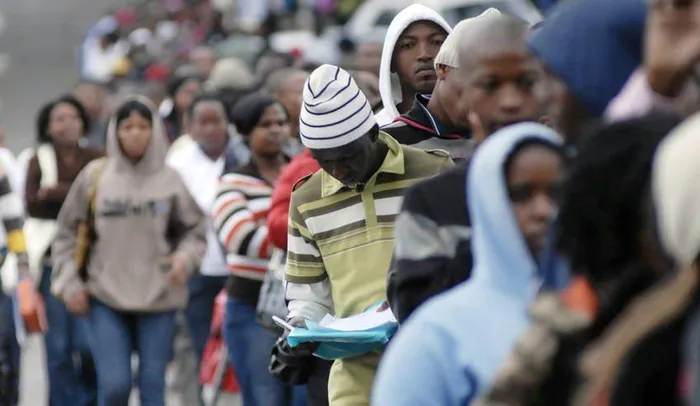
Young job seekers queue in the cold with CVs in hand — a familiar scene that reflects the harsh realities of youth unemployment in the Northern Cape.
Image: Reuters / File picture
In this special Youth Day feature, Mogomotsi Motshegwe – youth leader, political science lecturer, and advocate for civic participation – reflects on the state of young people in the Northern Cape. His opinion piece serves as a prelude to a longer feature that includes the voices of several young people from across the province, “telling it like it is” — available in full on the DFA website.
LAST year, while travelling to Johannesburg, I had a conversation with a man that has never left me. He told me he had once lived in Kimberley, and what struck him most during his time there was witnessing – for the first time in his life – so many young people, including children, openly consuming alcohol. He spoke with heartbreak in his voice. That conversation stayed with me. It raised questions about the state of young people in our province – questions about family dynamics, intergenerational poverty, and the neglect of township development.
On June 16, we’ll once again hear speeches filled with grand promises: politicians pledging to fund youth businesses, claiming jobs are coming, and reminding us – rehearsed and robotic – that “young people are the future”. But the truth is this: the Northern Cape is failing its youth, and those in power seem unmoved.
While the youth of 1976 bravely fought the apartheid regime for freedom, justice, and access to quality education, 49 years later our fight has shifted – but it is no less urgent. We are now fighting unemployment, inequality, poverty, and systemic neglect. And the numbers keep rising.
According to the latest Stats SA report, South Africa’s youth unemployment rate stands at a staggering 46.1%. In the Northern Cape, there has been a recorded decline of 12,000 jobs, worsening an already fragile provincial economy.
Young people aged 15-34 remain the most vulnerable group in the labour market. Many are trapped in a cycle of short-term learnerships – six-month stints with a stipend of around R2,000. These are celebrated as "employment opportunities", yet they offer no long-term job prospects or upward mobility.
It is dehumanising to see young people standing in long queues, clutching their CVs, hoping to be selected for a learnership – not because it offers a future, but because it’s the only available income. The constant hopping from one temporary programme to another reflects not opportunity, but desperation. This is not dignity. This is not development. Le rona re batho.
Despite having higher levels of education than our parents, we remain locked out of stable employment. We wait longer to find work, and we enter adulthood with fewer prospects and more pressure. The so-called "youth bulge" is not a dividend – it’s becoming a crisis.
What we need is not charity. We are demanding dignity – and dignity comes from decent, secure, and meaningful work, not tokenistic job placements. We need a serious, well-funded provincial youth employment strategy, backed by measurable targets and unwavering political will.
But the problem runs deeper than jobs. It is also about the places where we live. Townships – a cruel legacy of apartheid spatial planning – were never meant to be centres of opportunity and thriving. They were designed to control and contain the lives of people of colour. And decades into democracy, that reality has hardly changed.
Many young people in the Northern Cape live in poverty-stricken, underdeveloped townships. These areas lack parks, libraries, youth centres, and computer labs – the very infrastructure that could help young people develop, both personally and professionally. Instead, we are left with nothing to do, nowhere to go, and no one who seems to care. How can anyone be surprised when hopelessness sets in? What are young people supposed to do with all this time and no opportunities?
Young people are becoming impatient with democracy. In the 2024 national elections, voter turnout in the Northern Cape dropped from 67% in 2019 to 62%. This is not just apathy – it is a symptom of deeper disillusionment. Young people are no longer buying into the empty rhetoric. They are tired. They are angry. And they are losing faith in the very democracy they were promised would deliver a better life.
Young people in the Northern Cape are bleeding. We wake up each day to the same crushing reality: unemployment, underdevelopment, and limited prospects. The repeated line that we are building a “modern, growing, and successful province” feels hollow when we are jobless, poor, and voiceless – confined to townships that break our spirits.
We do not want handouts. We do not want more slogans. We want to live in a province – and a country – that sees us, hears us, and values us. Le rona re batho. We, too, are human. We deserve dignity, opportunity, and a future we can believe in.
As we celebrate Youth Day 2025, I encourage young people to be interested and participate in politics. You might not be interested in politics, but remember that politics is interested in you – and it colours everything around you, every day. Politics is about who gets what, where, and when.
About the author: Mogomotsi Motshegwe is currently pursuing a Master’s degree in Political Science at the University of Pretoria. He is a Public Service Fellow at Futurelect and serves as a Youth Advisory Panellist for the United Nations Population Fund. He lectures in Political Science and International Relations and writes in his personal capacity.
Read the full article featuring several young people’s reflections on what June 16 means to them today.
Related Topics: